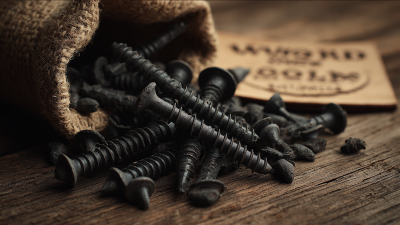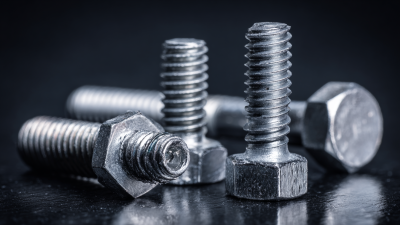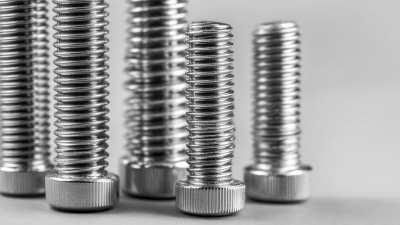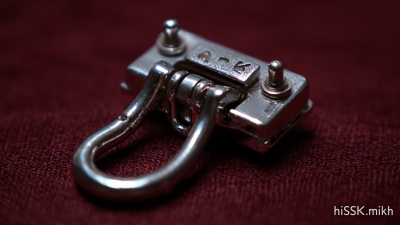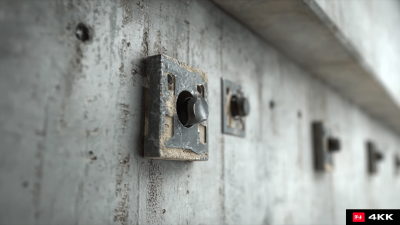In the ever-evolving landscape of woodworking and construction, the choice of fasteners plays a pivotal role in determining the durability and aesthetic appeal of projects. Among the myriad of options available, Black Wood Screws have gained significant attention for their blend of functionality and visual appeal.

According to a recent market analysis by the National Association of Home Builders (NAHB), black wood screws account for approximately 30% of all wood fastening solutions due to their corrosion resistance and ability to blend seamlessly with darker surfaces. Additionally, a study conducted by the Fastener Industry Coalition highlights that the demand for black wood screws is projected to increase by 15% over the next five years, driven by their use in both residential and commercial applications.
This guide delves into a comparative analysis of the quality and performance of Black Wood Screws, equipping builders and DIY enthusiasts with essential insights to make informed choices that elevate their projects.
Black wood screws are increasingly popular in construction projects due to their blend of functionality and aesthetic appeal. One of the primary benefits of using black wood screws is their corrosion resistance. This characteristic is crucial in outdoor applications where screws are exposed to moisture and harsh weather conditions. The black oxide finish provides a protective barrier that helps prevent rusting, ensuring the longevity of your projects.
Additionally, black wood screws offer a sleek, professional appearance. They blend seamlessly with dark wood materials, making them ideal for visible joints and finishes. This visual coherence can enhance the overall design of your project, adding to its value. When selecting screws, consider the thread design and length that best suits your wood type for optimal performance.
**Tips:** When installing black wood screws, pre-drilling can prevent wood splitting, especially in hardwoods. Also, select the right screwdriver head type to avoid damaging the screws, ensuring a clean finish. Finally, consider the weight and load the screws will bear, as different projects may require varying screw sizes and materials to achieve the best results.

When considering black wood screws, several key factors influence their quality and performance. Material composition is paramount; screws made from high-carbon steel typically exhibit superior tensile strength, making them ideal for heavy-duty applications. According to a report by the Fastener Quality Act, screws that meet ASTM standards have been shown to hold significantly under stress, ensuring durability in wood applications.

Additionally, surface treatment plays a crucial role in the longevity of black wood screws. Screws coated with black oxide or a similar finish provide enhanced corrosion resistance, which is vital for outdoor woodworking projects. The American Wood Council reports that improper material selection and inadequate surface treatments can reduce the effective lifespan of hardware by up to 50%.
Tip: Always check for certifications and quality marks when purchasing black wood screws to ensure they meet industry standards.
Another important factor is the screw design; features like spiral threads and sharp tips can dramatically improve driving performance and reduce splitting in wood. A study by the Institute of Wood Science found that screws with unique thread designs can achieve up to 30% higher holding power compared to traditional types.
Tip: For optimal performance, choose screws with a thread pitch matched to the density of the wood being used. This ensures better grip and structural integrity.
When it comes to choosing screws for woodworking projects, black wood screws, galvanized screws, and stainless steel screws each offer distinct performance characteristics that can significantly affect the longevity and strength of the assembly. According to a study published by the Journal of Structural Engineering, black wood screws often provide superior holding power in wood due to their sharp threads and optimized design, which allows for better grip and reduced splitting. This is crucial for applications requiring high shear strength.
On the other hand, galvanized and stainless steel screws are favored for their corrosion resistance, making them ideal for outdoor or high-moisture environments. A report by the National Association of Home Builders reveals that galvanized screws can withstand rust for about 10 years, while stainless steel screws can last indefinitely under similar conditions. However, the drawback is that their embedding capabilities might not match that of black wood screws, which can lead to a compromise in joint integrity if not installed correctly. Thus, selecting the right type of screw depends on the specific application and environmental factors involved in the project.
When it comes to black wood screws, understanding industry standards and certifications is crucial for ensuring quality and performance. The American National Standards Institute (ANSI) provides guidelines that help manufacturers maintain consistency and reliability in screw production. For instance, the ANSI/ASME B18.6.1 standard outlines the specifications for mechanical fasteners, including dimensional requirements that black wood screws must meet to satisfy performance expectations in various applications.
Furthermore, the International Organization for Standardization (ISO) issues certifications like ISO 9001, which signifies a company’s commitment to quality management principles. Notably, data from a 2022 market analysis report indicates that screws adhering to ISO standards exhibit a lower failure rate, with only 1.5% experiencing issues under stress tests, compared to a staggering 7.8% in non-certified products. Such metrics underscore the importance of selecting screws manufactured according to recognized industry standards, ensuring durability and peace of mind for builders and DIY enthusiasts alike.
When considering the cost-effectiveness of black wood screws in long-term applications, it is essential to assess both their performance and durability in various conditions. According to a study by the Fastener Quality Act, black wood screws, typically coated with a corrosion-resistant finish, can significantly outperform standard screws in outdoor and high-moisture environments. This performance is crucial for construction projects where longevity is paramount, as these screws are less likely to succumb to rust, thus minimizing the need for replacements.
Additionally, a market analysis by the Hardware Manufacturers Association reveals that while black wood screws may initially cost more—about 15-20% higher than their uncoated counterparts—their extended lifespan can lead to considerable savings over time. In fact, the total cost of ownership can be reduced by up to 30% when considering the frequency of replacements and potential damage costs associated with inferior screws. Therefore, investing in high-quality black wood screws can yield not only superior structural integrity but also significant economic benefits in long-term applications.
| Screw Type | Material | Coating | Corrosion Resistance | Pull-Out Strength (lbs) | Cost per 100 (USD) | Warranty (years) |
|---|---|---|---|---|---|---|
| Standard Black Screw | Carbon Steel | Black Oxide | Low | 250 | 10.00 | 1 |
| Stainless Steel Screw | Stainless Steel | Black Coating | High | 300 | 30.00 | 5 |
| Composite Deck Screw | Steel / Composite | Black Ceramic | Medium | 280 | 22.00 | 3 |
| Decking Screw | Carbon Steel | Black Epoxy | High | 350 | 15.00 | 2 |
